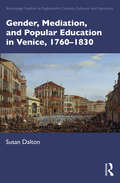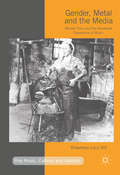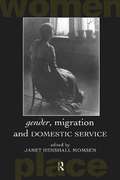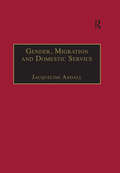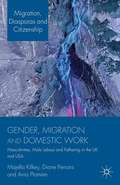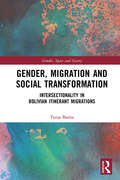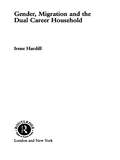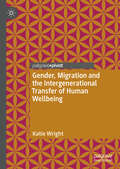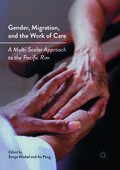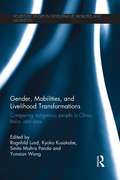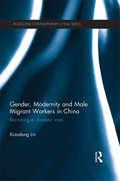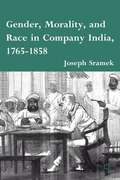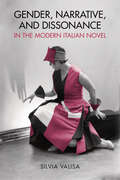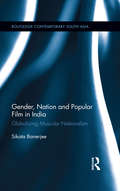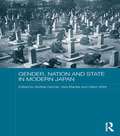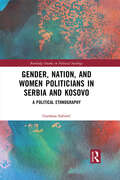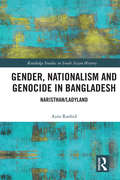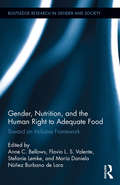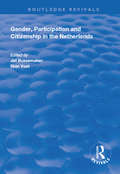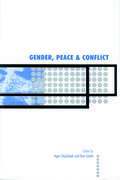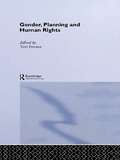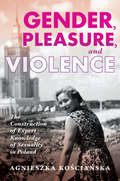- Table View
- List View
Gender, Mediation, and Popular Education in Venice, 1760–1830 (Routledge Studies in Eighteenth-Century Cultures and Societies)
by Susan DaltonGender, Mediation, and Popular Education in Venice, 1760–1830 examines how women with enough cultural capital could turn their identity as representatives of "the public" – those on the receiving end of education – to their advantage, producing knowledge under the guise of relaying it. Author Susan Dalton looks at the question of how elite women turned their reputation for ignorance into an opportunity to establish themselves as authors at the dawn of the nineteenth century in Venice. Many literary figures saw women as a group in need of education. By deploying essentialist understandings of femininity, whereby women possessed superior moral virtue but deficient rationality, these women entered the world of print as cultural mediators, identified by contemporaries as key players in the social projects of public education and moral edification central to the European Enlightenment. Focussing on Isabella Teotochi Albrizzi and Giustina Renier Michiel, both renowned Venetian authors, Dalton introduces two well-known Italian women of letters to English-speaking scholars, re-evaluates the impact of their writing in Italy and raises questions about female authorship across Europe, broadens our conceptions of gender norms, and enriches our knowledge of a little-known period of women’s writing in Italy. This volume is an essential resource for students and scholars alike interested in women’s and gender history, early modern history and social and cultural history.
Gender, Metal and the Media: Women Fans and the Gendered Experience of Music (Pop Music, Culture and Identity)
by Rosemary Lucy HillThis book is a timely examination of the tension between being a rock music fan and being a woman. From the media representation of women rock fans as groupies to the widely held belief that hard rock and metal is masculine music, being a music fan is an experience shaped by gender. <P><P>Through a lively discussion of the idealised imaginary community created in the media and interviews with women fans in the UK, Rosemary Lucy Hill grapples with the controversial topics of groupies, sexism and male dominance in metal. She challenges the claim that the genre is inherently masculine, arguing that musical pleasure is much more sophisticated than simplistic enjoyments of aggression, violence and virtuosity. <P>Listening to women’s experiences, she maintains, enables new thinking about hard rock and metal music, and about what it is like to be a women fan in a sexist environment.
Gender, Metal and the Media: Women Fans and the Gendered Experience of Music (Pop Music, Culture and Identity)
by Rosemary Lucy HillThis book is a timely examination of the tension between being a rock music fan and being a woman. From the media representation of women rock fans as groupies to the widely held belief that hard rock and metal is masculine music, being a music fan is an experience shaped by gender. Through a lively discussion of the idealised imaginary community created in the media and interviews with women fans in the UK, Rosemary Lucy Hill grapples with the controversial topics of groupies, sexism and male dominance in metal. She challenges the claim that the genre is inherently masculine, arguing that musical pleasure is much more sophisticated than simplistic enjoyments of aggression, violence and virtuosity. Listening to women’s experiences, she maintains, enables new thinking about hard rock and metal music, and about what it is like to be a women fan in a sexist environment.
Gender, Migration and Domestic Service (Routledge International Studies of Women and Place)
by Janet Henshall MomsenThis book examines a wide range of migration patterns which have arisen, and exposes the tensions and difficulties including: * legal and empowerment issues * cultural and language diversities and barriers * the impact of live-in employment. The book features case studies taken from Europe, South and North America, the Caribbean, Asia, and Africa and uses original fieldwork using quantitative and qualitative methods.
Gender, Migration and Domestic Service: The Politics of Black Women in Italy (Interdisciplinary Research Series in Ethnic, Gender and Class Relations)
by Jacqueline AndallThe book examines the experiences of Black women in Italy from the 1970s to the 1990s. Although Italy is still perceived as a recent immigration country, the book demonstrates how Black women were among the first groups of new migrants to the country. Black women migrating to Italy were employed almost exclusively as live-in domestic workers and detailed attention is paid to the history and political organization of this sector. Unlike much published work in Italian, this book adopts an integrated form of analysis where gender, ethnicity and class are seen to be interconnected constructs. The book also situates Black women within the framework of the national constituency of gender. This approach challenges the ideology surrounding the Italian family and demonstrates that while live-in domestic work created specific forms of social marginality for Black women, it paradoxically allowed Italian women to express their new social identities within and outside the family. The book concludes that Italian women have largely failed in their attempts to transform the division of labour within the home and that the decision to employ other (migrant) women to fulfill household tasks is a trend which sits uneasily within the framework of an inclusive feminist project for women.
Gender, Migration and Domestic Work
by Pierrette Hondagneu-Sotelo Ania Plomien Majella Kilkey Diane Perrons Hernan RamirezBased on studies conducted in the UK and USA, this book investigates the experiences of suppliers and consumers of masculinized domestic services, exploring issues such as increasing inequality, migration, the rise of commoditized domestic services, contemporary masculinities and the gendering of paid work.
Gender, Migration and Social Transformation: Intersectionality in Bolivian Itinerant Migrations (Gender, Space and Society)
by Tanja BastiaIntersectionality can be used to analyse whether migration leads to changes in gender relations. This book finds out how migrants from a peri-urban neighbourhood on the outskirts of Cochabamba, Bolivia, make sense of the migration journeys they have undertaken. Migration is intrinsically related to social transformation. Through life stories and community surveys, the author explores how gender, class, and ethnicity intersect in people’s attempts to make the most of the opportunities presented to them in distant labour markets. While aiming to improve their economic and material conditions, migrants have created a new transnational community that has undergone significant changes in the ways in which gender relations are organised. Women went from being mainly housewives to taking on the role of the family’s breadwinner in a matter of just one decade. This book asks and addresses important questions such as: what does this mean for gender equality and women’s empowerment? Can we talk of migration being emancipatory? Does intersectionality shed light in the analysis of everyday social transformations in contexts of transnational migrations? This book will be useful to researchers and students of human geography, development studies and Latin America area studies.
Gender, Migration and the Dual Career Household (Routledge International Studies of Women and Place #Vol. 4)
by Irene HardillThis book explores the gender issues associated with international migration in dual career households. Adopting a feminist approach, the author links research in economics, sociology, management and business and human geography to explore post-industrial managerial and professional careers. Particular emphasis is placed on the way in which social mobility and spatial mobility are entwined. The author explores the location and mobility decisions of dual career households, examining their personal and household biographies as well as published statistics. Of essential interest to scholars of human geography, sociology and gender studies, this book will also interest those working in organizational, migration and urban studies.
Gender, Migration and the Intergenerational Transfer of Human Wellbeing
by Katie WrightThis book discusses how human wellbeing is constructed and transferred intergenerationally in the context of international migration. Research on intergenerational transmission (IGT) has tended to focus on material asset transfers prompting calls to balance material asset analysis with that of psychosocial assets – including norms, values attitudes and behaviors. Drawing on empirical research undertaken with Latin American migrants in London, Katie Wright sets out to redress the balance by examining how far psychosocial transfers may be used as a buffer to mediate the material deprivations that migrants face via adoption of a gender, life course and human wellbeing perspective.
Gender, Migration, and the Work of Care
by Sonya Michel Ito PengThis book explores how around the world, women's increased presence in the labor force has reorganized the division of labor in households, affecting different regions depending on their cultures, economies, and politics; as well as the nature and size of their welfare states and the gendering of employment opportunities. As one result, the authors find, women are increasingly migrating from the global south to become care workers in the global north. This volume focuses on changing patterns of family and gender relations, migration, and care work in the countries surrounding the Pacific Rim--a global epicenter of transnational care migration. Using a multi-scalar approach that addresses micro, meso, and macro levels, chapters examine three domains: care provisioning, the supply of and demand for care work, and the shaping and framing of care. The analysis reveals that multiple forms of global inequalities are now playing out in the most intimate of spaces.
Gender, Mobilities, and Livelihood Transformations: Comparing Indigenous People in China, India, and Laos (Routledge Studies in Development, Mobilities and Migration)
by Kyoko Kusakabe Ragnhild Lund Smita Mishra Panda Yunxian WangIn the era of globalization many minority populations are subject to marginalization and expulsion from their traditional habitats due to rapid economic restructuring and changing politico-spatial relations. This book presents an analytical framework for understanding how mobility is an inherent part of such changes. The book demonstrates how current neoliberal policies are making people increasingly on the move – whether voluntarily or forced, and whether individually, as family, or as whole communities – and how such mobility is changing the livelihoods of indigenous people, with particular focus on how these transformations are gendered. It queries how state policies and cross-border and cross-regional connections have shaped and redefined the livelihood patterns, rights and citizenship, identities, and gender relations of indigenous peoples. It also identifies the dynamic changes that indigenous men and women are facing, given rapid infrastructure improvements and commercialization and/or industrialization in their places of Environment. With a focus on mobility, this innovative book gives students and researchers in development studies, gender studies, human geography, anthropology and Asian studies a more realistic assessment of peoples livelihood choices under a time of rapid transformation, and the knowledge produced may add value to present development policies and practices.
Gender, Modernity and Male Migrant Workers in China: Becoming a 'Modern' Man (Routledge Contemporary China Series)
by Xiaodong LinRural-urban migration within China has transformed and reshaped rural people’s lives during the past few decades, and has been one of the most visible phenomena of the economic reforms enacted since the late 1970s. Whilst Feminist scholars have addressed rural women’s experience of struggle and empowerment in urban China, in contrast, research on rural men’s experience of migration is a neglected area of study. In response, this book seeks to address the absence of male migrant workers as a gendered category within the current literature on rural-urban migration. Examining Chinese male migrant workers’ identity formation, this book explores their experience of rural-urban migration and their status as an emerging sector of a dislocated urban working class. It seeks to understand issues of gender and class through the rural migrant men’s narratives within the context of China’s modernization, and provides an in-depth analysis of how these men make sense of their new lives in the rapidly modernizing, post-Mao China with its emphasis on progress and development. Further, this book uses the men’s own narratives to challenge the elite assumption that rural men’s low status is a result of their failure to adopt a modern urban identity and lifestyle. Drawing on interviews with 28 male rural migrants, Xiaodong Lin unpacks the gender politics of Chinese men and masculinities, and in turn contributes to a greater understanding of global masculinities in an international context. This book will be of great interest to students and scholars working in the fields of Chinese culture and society, gender studies, migration studies, sociology and social anthropology. Shortlisted for this year's BSA Philip Abrams Memorial Prize.
Gender, Morality, and Race in Company India, 1765-1858
by Joseph SramekBetween 1765 and 1858, British imperialists in India obsessed continuously about gaining and preserving Indian "opinion" of British moral and racial prestige. Weaving political, intellectual, cultural, and gender history together in an innovative approach, "Gender, Morality, and Race in Company India, 1765-1858" examines imperial anxieties regarding British moral misconduct in India ranging from debt and gift giving to drunkenness and irreligion and points out their wider relationship to the structuring of British colonialism. Showing a pervasive fear among imperial elites of losing "mastery" over India, as well as a deep distrust of Indian civil and military subordinates through whom they ruled, Sramek demonstrates how much of the British Raj's notable racial arrogance after 1858 can in fact be traced back into the preceding Company period of colonial rule. Rather than the Sepoy Rebellion of 1857 ushering in a more racist form of colonialism, this book powerfully suggests far greater continuity between the two periods of colonial rule than scholars have hitherto generally recognized. "
Gender, Narrative, and Dissonance in the Modern Italian Novel
by Silvia ValisaCombining close textual readings with a broad theoretical perspective, Gender, Narrative, and Dissonance in the Modern Italian Novel is a study of the ways in which gender shapes the principal characters and narratives of seven important Italian novels of the nineteenth and twentieth centuries, from Alessandro Manzoni's I promessi sposi (1827) to Elsa Morante's Aracoeli (1982).Silvia Valisa's innovative approach focuses on the tensions between the characters and the gender ideologies that surround them, and the ways in which this dissonance exposes the ideological and epistemological structures of the modern novel. A provocative account of the intersection between gender, narrative, and epistemology that draws on the work of Georg Lukács, Barbara Spackman, and Teresa de Lauretis, this volume offers an intriguing new approach to investigating the nature of fiction.
Gender, Nation and Popular Film in India: Globalizing Muscular Nationalism (Routledge Contemporary South Asia Series)
by Sikata BanerjeeInterpretations of manhood have unfolded in India within a middle class cultural milieu shaped by an assertive self-confidence fuelled by liberalisation, a process by which India has been integrated into the global political economy and the prominence of Hindutva or Hindu nationalist politics. This book unpacks a particular gendered vision of nation in the modern Indian context by drawing on popular films. This muscular nationalism is an intersection of a specific vision of masculinity with the political doctrine of nationalism. The idea of nation is animated by an idea of manhood associated with martial prowess, muscular strength and toughness, but coupled with the image and construct of virtuous woman – a gendered binary of martial man and chaste woman. The author skilfully and convincingly draws together issues of political economy, including globalization and neoliberalism with majoritarian politics and popular culture, thus showing how disparate strands intersect and build on each other. Using interpretive methodologies and popular media, the book presents new interpretations of Bollywood films through the lenses of gender, masculinity and nationalism. It will be of interest to scholars of South Asian politics and culture, in particular Indian nationalism, popular culture, media and gender studies.
Gender, Nation and State in Modern Japan (ASAA Women in Asia Series)
by Andrea Germer, Vera Mackie and Ulrike WöhrGender, Nation and State in Modern Japan makes a unique contribution to the international literature on the formation of modern nation–states in its focus on the gendering of the modern Japanese nation-state from the late nineteenth century to the present. References to gender relations are deeply embedded in the historical concepts of nation and nationalism, and in the related symbols, metaphors and arguments. Moreover, the development of the binary opposition between masculinity and femininity and the development of the modern nation-state are processes which occurred simultaneously. They were the product of a shift from a stratified, hereditary class society to a functionally-differentiated social body. This volume includes the work of an international group of scholars from Japan, the United States, Australia and Germany, which in many cases appears in English for the first time. It provides an interdisciplinary perspective on the formation of the modern Japanese nation–state, including comparative perspectives from research on the formation of the modern nation–state in Europe, thus bringing research on Japan into a transnational dialogue. This volume will be of interest in the fields of modern Japanese history, gender studies, political science and comparative studies of nationalism.
Gender, Nation and Women Politicians in Serbia and Kosovo: A Political Ethnography (Routledge Studies in Political Sociology)
by Gordana SubotićThis book examines the ways women politicians in Serbia and Kosovo have imagined, constructed, and politicised national identity and gender while engaging with politics in the context of the democratisation process. The first book to focus on the work of women inside political structures, it draws on participant observation and interview material to answer the question of how women in positions of power and influence deal with their national identity and gender in societies deeply divided along ethnic lines. Based on close studies of the work of a small number of women from different ethnic backgrounds, the author offers comparative analyses of the ways in which women politicians of different ethnicities respond to similar events in their everyday work. An original political ethnography that considers engagement of women in formal politics, this volume will appeal to scholars across the social sciences with interests in political structures and political participation, particularly as these relate to questions of gender, nation and ethnicity.
Gender, Nation, and Nationalism: Perspectives of Tibetan Women in Exile
by Amrita SaikiaThis book looks at the question of the Tibetan nation from the perspective of Tibetan women in exile. It situates Tibetan women within the debate of Tibetan nation-building and nationalism in exile. In doing so, the book explores Tibetan women’s construction of the idea of the Tibetan nation, their contributions to Tibetan nationalism, their position in Tibetan society, and the nuances of identity. The author captures the experiences, views, and realities of Tibetan women in exile, drawing from interviews conducted with participants in three Tibetan settlements in India.This book is an important contribution to feminist discourse on gender, nation, and nationalism in the context of the Tibetans in exile. It will appeal to readers and scholars interested in Tibetan studies, nationalism, feminism, women’s studies, and Asian studies.
Gender, Nationalism, and Genocide in Bangladesh: Naristhan/Ladyland (Routledge Studies in South Asian History)
by Azra RashidThe 1971 genocide in Bangladesh took place as a result of the region’s long history of colonization, the 1947 partition of the Indian subcontinent into largely Muslim Pakistan and Hindu India, and the continuation of ethnic and religious politics in Pakistan, specifically the political suppression of the Bengali people of East Pakistan. The violence endured by women during the 1971 genocide is repeated in the writing of national history. The secondary position that women occupy within nationalism is mirrored in the nationalist narratives of history. This book engages with the existing feminist scholarship on gender, nationalism and genocide to investigate the dominant representations of gender in the 1971 genocide in Bangladesh and juxtaposes the testimonies of survivors and national memory of that war to create a shift of perspective that demands a breaking of silence. The author explores and challenges how gender has operated in service of Bangladeshi nationalist ideology, in particular as it is represented at the Liberation War Museum. The archive of this museum in Bangladesh is viewed as a site of institutionalized dialogue between the 1971 genocide and the national memory of that event. An examination of the archive serves as an opening point into the ideologies that have sanctioned a particular authoring of history, which is written from a patriarchal perspective and insists on restricting women’s trauma to the time of war. To question the archive is to question the authority and power that is inscribed in the archive itself and that is the function performed by testimonies in this book. Testimonies are offered from five unique vantage points – rape survivor, war baby, freedom fighter, religious and ethnic minorities – to question the appropriation and omission of women’s stories. Furthermore, the emphasis on the multiplicity of women’s experiences in war seeks to highlight the counter-narrative that is created by acknowledging the differences in women’s experiences in war instead of transcending those differences. An innovative and nuanced approach to the subject of treatment and objectification of women in conflict and post conflict and how the continuing effects entrench ideas of gender roles and identity, this book will be of interest to academics in the fields of South Asian History and Politics, Gender and genocide, Women and War, Nationalism and Diaspora and Transnational Studies.
Gender, Nutrition, and the Human Right to Adequate Food: Toward an Inclusive Framework (Routledge Research in Gender and Society)
by Anne C. Bellows Flavio L. S. Valente Stefanie Lemke María Daniela Núñez Burbano de LaraThis book introduces the human right to adequate food and nutrition as evolving concept and identifies two structural "disconnects" fueling food insecurity for a billion people, and disproportionally affecting women, children, and rural food producers: the separation of women’s rights from their right to adequate food and nutrition, and the fragmented attention to food as commodity and the medicalization of nutritional health. Three conditions arising from these disconnects are discussed: structural violence and discrimination frustrating the realization of women’s human rights, as well as their private and public contributions to food and nutrition security for all; many women’s experience of their and their children’s simultaneously independent and intertwined subjectivities during pregnancy and breastfeeding being poorly understood in human rights law and abused by poorly-regulated food and nutrition industry marketing practices; and the neoliberal economic system’s interference both with the autonomy and self-determination of women and their communities and with the strengthening of sustainable diets based on democratically governed local food systems. The book calls for a social movement-led reconceptualization of the right to adequate food toward incorporating gender, women’s rights, and nutrition, based on the food sovereignty framework.
Gender, Participation and Agriculture: From Policy to Practice
by Faraha Nawaz Sangida Afrog RupaThis book presents an extensive study of women’s involvement in agricultural activities at the family level in rural Bangladesh, with a particular emphasis on their participation in decision-making. The authors examine the extent to which women are involved in decision-making regarding agricultural practices at family level. In addition to examining women’s contributions to various agricultural tasks, the research expands its scope to include discussions on gender inequality and empowerment, integrating these concepts into the decision-making framework. The authors argue that true participation should not only address the involvement of women in agriculture but also consider their influence on decision-making processes. They stress the importance of factors such as autonomy, control over resources, and self-confidence, which play a crucial role in shaping women’s decision-making ability within the family. Moreover, the research identifies several key barriers to participation, including entrenched patriarchal norms, societal cultural expectations, and institutional challenges, which hinder women’s active involvement in decision-making. The authors advocate for policy reforms and institutional changes to address these challenges, urging government bodies to align policies with their recommendations. The book provides valuable insights for policymakers, government officials, and NGOs working to promote gender-based approach and improve women’s empowerment in rural communities.
Gender, Participation and Citizenship in the Netherlands (Routledge Revivals)
by Jet Bussemaker Rian VoetPublished in 1998, this is an edited volume of papers on the theme of participation and citizenship for women. It focuses particularly on the necessary conditions for full participation of women as citizens within a modern liberal democracy. For this question it takes the Netherlands as an interesting case study, because it shows the need for a close connection between social and political participation. The editors aim to draw together often separate discussions about citizenship in international literature - a political-theoretical discussion of democracy and a social-policy discussion on the welfare state. The papers address issues including the labour market, public goods, welfare laws, affirmative action programmes and future development for girls. The book also develops the interrelation of social and political participation from the perspective of citizenship. It relates information on the Dutch case study to international comparative research on democracy and welfare states, as well as to broader international discussions on gender and citizenship.
Gender, Peace and Conflict (International Peace Research Institute, Oslo (PRIO))
by Dan Smith Inger Skjelsbæk- What impact does gender difference make to political decision-making? - Will the political empowerment of women contribute to a more peaceful world? The role of gender has been increasingly recognized as central to the study and analysis of the traditionally male domains of war and international relations. This book explores the key role of gender in peace research, conflict resolution and international politics. Rather than simply 'add gender' the aim is to transcend different disciplinary boundaries and conceptual approaches to provide a more integrated basis for future study. To this end it uniquely combines theoretical chapters alongside empirical case studies to demonstrate the importance of a gender perspective to both theory and practice in conflict resolution and peace research. The theoretical chapters explore the gender relationship and engage with the many stereotypical dichotomies like femininity and peace and masculinity and war. The case study chapters (drawing on examples from South America, South Asia and Europe, including former Yugoslavia) move beyond theoretical critique to focus on issues like sexual violence in war, the role of women in military groups and peacekeeping operations and the impact of a 'critical mass' of women in political decision-making. Gender, Peace and Conflict will provide an invaluable survey and new insights to a central area of contemporary research. It will be essential reading for academics, students and practitioners across peace studies, conflict resolution and international politics.
Gender, Planning and Human Rights (Routledge International Studies of Women and Place)
by Tovi FensterChallenging the traditional treatment of human rights cast in purely legal frameworks, the authors argue that, in order to promote the notion of human rights, its geographies and spatialities must be investigated and be made explicit. A wealth of case studies examine the significance of these components in various countries with multi-cultured societies, and identify ways to integrate human rights issues in planning, development and policy making. The book uses case studies from UK, Israel, Canada, Singapore, USA, Peru, European Union, Australia and the Czech Republic.
Gender, Pleasure, and Violence: The Construction of Expert Knowledge of Sexuality in Poland (New Anthropologies of Europe)
by Agnieszka KościańskaBehind the Iron Curtain, the politics of sexuality and gender were, in many ways, more progressive than the West.While Polish citizens undoubtedly suffered under the oppressive totalitarianism of socialism, abortion was legal, clear laws protected victims of rape, and it was relatively easy to legally change one's gender. In Gender, Pleasure, and Violence, Agnieszka Kościańska reveals that sexologists—experts such as physicians, therapists, and educators—not only treated patients but also held sex education classes at school, published regular columns in the press, and authored highly popular sex manuals that sold millions of copies. Yet strict gender roles within the home meant that true equality was never fully within reach. Drawing on interviews, participant observation, and archival work, Kościańska shares how professions like sexologists defined the notions of sexual pleasure and sexual violence under these sweeping cultural changes.By tracing the study of sexual human behavior as it was developed and professionalized in Poland since the 1960s, Gender, Pleasure, and Violence explores how the collapse of socialism brought both restrictions in gender rights and new opportunities.
